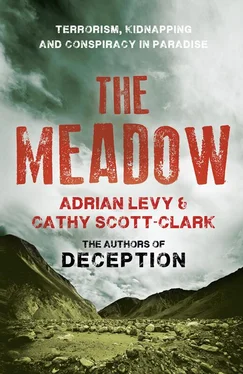Their destination was a high-altitude ice cave called Amarnath that was dedicated to Lord Shiva, the Hindu god of destruction and transformation. A giant, gaping hole, it looked as if a meteorite had slammed into the side of a mountain. While Amarnath was virtually unknown in the West, it was revered across India as an ancient Hindu pilgrimage site, to which hundreds of thousands of devotees flocked annually. Some came by foot, others by pony, a few on their hands and knees, the least able piggybacking on local guides, everyone scrabbling to scale the mountains so as to demonstrate the depth of their faith.
Don was drawn by the collective act of devotion, and loved the idea of going on Shiva’s trail, but he and Jane intended to arrive at the end of June, before the main pilgrimage season began the following month. That way they would have the route to themselves. After Amarnath they would head west, following the ice-water streams down to the lush pasture of the Lidderwat Valley, where mountain flowers gorged on snowmelt, according to the guidebooks. There they would pitch their tents at a legendary campsite that travellers simply referred to as ‘the Meadow’, a velvet green cleft at a little over ten thousand feet, with an icy river running through it and enveloped on all sides by conifer forests. There was something prosaic, minimalist even, about the sound of the Meadow. Don and Jane looked forward to pitching camp up high, surrounded by aromatic mountain pasture.
By late evening, Jane had placed tidy little heaps of possessions all over the bedroom floor. Now she slid each one of them into a separate waterproof pouch, working on a maximum load of fifteen kilos per person. Using the vacuum cleaner, she sucked the air out of each before slotting the shrivelled jellyfishes they now resembled into the new frameless purple-and-red Sundog daypacks she and Don had bought during a recent club trip to Montana. For Jane, packing was an art, the trip broken down into components, each of them carefully arranged like evidence at a crime scene, then layered in a bag that just might save you one day. Plasters, antiseptic spray, teabags, Don’s favourite Snickers bars; and should she bring some more Imodium? Could you get Imodium over there? She did not know, and threw in an extra packet.
The most important thing was her journal, in which she would note down the route, the ascents, the views, as well as snippets of lore picked up from locals and information on flowers and plants. Sometimes she enjoyed the quiet moments after dusk just as much as the walking, a time to lounge across their sleeping bags making notes, with books scattered around, her head propped against Don’s flat stomach, their limbs heavy from exertion. This was a real existence, the living that gave purpose to life.
Batteries, waterproof bags, first-aid kit, rolls of film; she counted the final items off her list. Don’s post-expedition slide shows at the house had become a tradition among the Spokane Mountaineers. They were nothing flashy, just a chance for Don to cook, try out the latest micro-brewery beers and give a talk. He loved to share what he had seen. Some people didn’t get that Don and Jane were just who they appeared to be. They had no interest in getting one over on anybody, or crowing about their far-flung adventures. There was no edge to them. Their lives were about getting out and making it back sufficiently healthy to tell others what they had experienced.
As she finished packing, Jane reminded herself to remind Don about his black-and-yellow Casio altimeter. He would be sorely disappointed if he got halfway over Mahagunas Top at fifteen thousand feet, only to realise he’d left it at home in a bedside drawer.
Finally she stood back and surveyed her handiwork, pondering the things that were not yet sorted out. Was this really a good time to go to Kashmir? What did they actually know? They had both had a gnawing sense of unease that had kicked in after they had bought the tickets, as they read that the region was in a state of flux, a worrying instability that became more real to them with every new snippet of information they gleaned from newspapers and magazines.
Don knew from his research that as a geographical and spiritual crossroads between the Arab world to the west, China to the north and the tropical subcontinent of India to the south, Kashmir had always been steeped in one conflict or another. Its recent troubles stemmed from the Partition of India in 1947, when the predominantly Muslim principality, whose residents longed for independence, had been split in two after both India and the newly founded Pakistan claimed it. Since then the two countries had fought three wars in their attempts to gain the other’s share, in 1947, 1965 and 1971, with the Muslim population of the Kashmir Valley caught between the aspirations of the warring neighbours, and held in a firm grip by the Indian government in New Delhi.
In the years after the 1971 conflict, Kashmir had settled down for a time. Srinagar, its summer capital, became a place of pilgrimage for Western backpackers, the valley eulogised by the likes of Led Zeppelin, whose music evoked a mystic kingdom of the mind, a lyrical paradise wreathed in hash smoke, drawing in thousands of visitors who put up on intricately carved wooden houseboats moored on the city’s tranquil lakes, Dal and Nagin. Between the lotus gardens, floating markets and bobbling villages glided some of the world’s most persistent salesmen, touting shawls woven from antelope hair, almond biscuits, semiprecious stones, papier-mâché boxes and sticky gobbets of dark charas from their hand-painted shikara boats, against a backdrop of the jagged Zabarwan mountains.
But these days Kashmir had an undercurrent of tension, especially after reports that New Delhi had rigged the state assembly polls of 1987, so as to box in the independence lobby. This ham-fisted act of muscle-flexing had gone largely unnoticed in the West, but had led to an explosion of protests in the state that had developed into an armed insurgency. For the past six years, bloody clashes had been erupting between Kashmiri Muslim youths calling for freedom from India, and the Indian security forces sent by New Delhi to neuter them. India accused Pakistan of exacerbating the dissent. Pakistan slammed India for triggering a revolution through its brutal crackdowns, as army bunkers rose up on the street corners of Srinagar, and post offices and cinemas were requisitioned as barracks and interrogation centres.
What little news leaked out had served to deter much of the foreign tourist trade. Rather than Kashmir, stoners and their disciples, adventurers and refugees from the West now headed for India’s Parvati Valley, or far south-west to the beaches and freshwater lagoons of Goa and Kerala. The number of tourists visiting the mountain state shrank from eighty thousand a year in the mid-eighties to fewer than ten thousand in 1994, leaving the houseboat owners destitute, dreaming of a time when their paradise had paid the bills.
Jane and Don knew they would have to be careful. But then, ascending a mountain was no different. ‘We did a lot of preparation before we left,’ Jane said. ‘We knew there was some turmoil in Kashmir, but we had been in northern India in 1991, and what we had heard about the Kashmir area from various people was that … there were no problems trekking in the areas where we were most interested.’ But in those days it was difficult to find up-to-date and accurate information about such a remote area without actually going there. ‘Don had recently purchased a computer for work, but he hated technology and we were not on email yet,’ Jane recalled. ‘Thus, we had limited access to news of that area.’ Jane and Don decided to leave for Kashmir with maps in hand, ready to switch destinations should they become spooked by the ground realities.
Читать дальше











